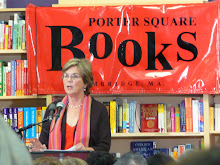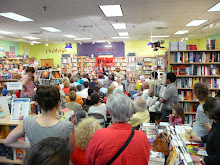September 8, 2008
Last night had an exciting meeting with two book clubs in Marblehead who combined for this discussion. Marblehead is the next town to Swampscott, Massachusetts where I grew up. A mixed group of men and women, some of whom had seen me on C-Span's "Book TV" the previous weekend. They also had done a wonderful reading of the book that elicited a lot of terrific questions and reflections about their own experiences and the history they lived through. What seemed to be of most interest to the men was that they didn't know how unequal the world was for women (although one thought that women had done very well during the 1960s). Most interesting to the women was to see themselves as actors in a transformational historic period.
Some stories....
Middlebury graduate: Like me, the only employer who came to her campus her senior year was the telephone company. She DID take a job as a customer service representative. She had also took a typing test at Snelling & Snelling in Lynn, a few years later, when she was trying to find a job other than as a customer service rep. She eventually found a career and started her own business.
Teacher: When she was interviewed, the principal asked her, "Do you plan to get married? If so, I can't hire you." He did in fact hire her because he did believe in women's talent but he was unusual and stood out from the principals she had later.
Stanford doctor: She graduated from medical school in 1964 and was one of two women in her class. The other woman flunked out after being told she was "too pretty" to be a doctor. Said she didn't become interested in "women's lib" because in the medical field, women who thought like the doctors treated her as badly as men. But, she said, she was treated very meanly by men who didn't think women should be doctors.
Sex, the military and global power: One woman asked me about my description of going into the red light district of Istanbul in 1963 and seeing it completely populated by American military personnel, sailors, soldiers all in uniform. The question: Is this still going on? Does the presence of the American military mean a large population of young girls get entrapped in prostitution? Who writes about this? Is the question about the American military and the sex trade still relevant? (Partial answer: Yes, and Cynthia Enloe writes about this in her book Bananas,Beaches and Bases.)
Bonnie H: "This book has a great narrative of women's history in the 60s and 70s. It is the first really cogent account I have read of how complex and how many varied strands had to come together to create what we call the second wave of feminism."
Big question: How does this history get passed on and why has the women's movement been omitted from the collective memory of the 1960s?
Monday, September 8, 2008
Subscribe to:
Post Comments (Atom)






1 comment:
I just learned about your book and will order it later today. I think one answer to this
Big question: How does this history get passed on and why has the women's movement been omitted from the collective memory of the 1960s?
is that rather than omitted, it's been reshaped into a caricature of itself. Much of the "third wave" discourse of the past 10 years or so started from the assumption that the "second wave" had been all white, unconcerned with issues of race, all middle-class, unconcerned with issues of class and the lives of working women, and mostly successful (!) in the sense of having achieved access to previously closed-off professional and business employment. Oh, and they burned bras. Susan Faludi, Ruth Rosen, and many others have tried to set the record straight on these points, yet the myths survive, because what Faludi called the Backlash worked, and it isn't over.
Post a Comment